The Magic Flute, 1975, directed by Ingmar Bergman, from the opera by Wolfgang Amadeus Mozart, libretto by Emanuel Schikaneder.
When someone says the name Ingmar Bergman, two words spring immediately to mind: Comic. Opera. Someone at Sveriges Radio made the obvious connection and hired Bergman to direct a film of Mozart's The Magic Flute to celebrate the 50th anniversary of the network. Filming an opera is perverse to begin with. Filming The Magic Flute, with its mess of a plot and paleolithic worldview, is stranger still. And hiring Bergman to direct is the coup de grâce.
Or perhaps not. While Bergman's popular image as Strindberg's heir makes him seem an odd choice, Peter Cowie writes that he is "an accomplished organist, and a musicologist with impressive knowledge of the Bach canon." File that piece of information right up there with Paul Verhoeven's doctorate in mathematics. And look at it this way: if you're a producer at Sveriges Radio, looking for a really fantastic anniversary film, what other Swedish directors are on your A-list?
Bergman's version of The Magic Flute is not the film I would have chosen to make. Mozart's opera is a mix of comedy and fantasy that seems well-suited for the movies. It has monsters, magic, battles, and a tour of Hell, all of which could be very cinematic. But instead of something like Branagh's Henry V, which really turns a play into a movie, however, Bergman chose to try to create on film an experience like seeing the opera performed in a theater. So the first shot after the overture is, well, what you'd see from the audience.
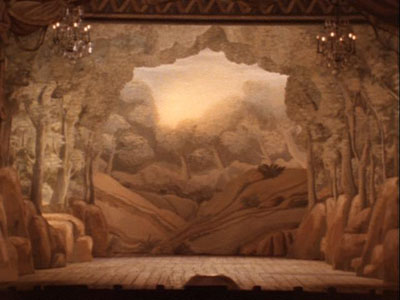
That's a meticulous reconstruction of the theater at Drottningholm Palace, built on a soundstage. I can appreciate what the filmmakers are going for here, but it seems like a step back from cinema. This initial impression isn't helped when "Zu Hilfe! Zu Hilfe!" starts playing and the dragon enters the stage:
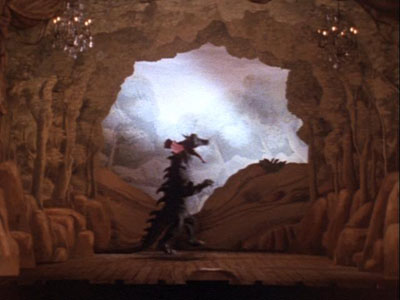
That may be what audiences would have seen in 1791, but it looks too much like Trogdor the Burninator to really put you in the moment. If you know the opera (I didn't), you know that the dragon is pursuing Prince Tamino, a valiant fighter who valiantly gets himself knocked out. He's played by Josef Köstlinger.
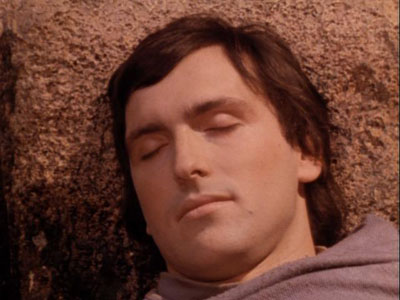
Fortunately for Tamino, he's saved by three servants of the forest's ruler, the Queen of the Night, who are played by Birgitta Smiding, Kirsten Vaupel, and Britt-Marie Aruhn:
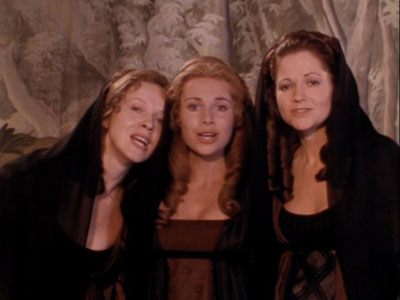
Unfortunately, he mistakenly believes he has been saved by Papageno, a hobbit-looking birdcatcher who lives in the same forest:
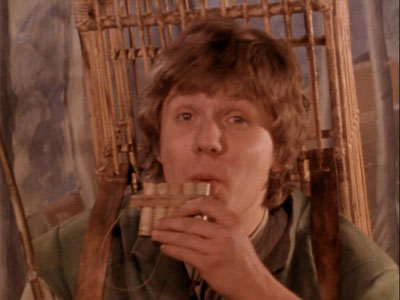
Once that hilarious misconception is straightened out, Birgit Nordin shows up as the Queen of the Night herself, looking more than a little ominous:
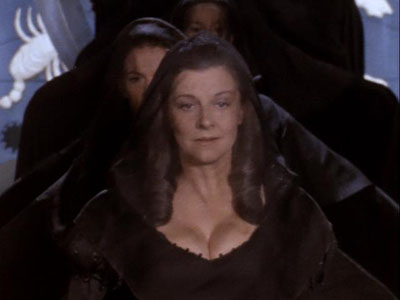
She makes Tamino an interesting proposition: if he can rescue her daughter Pamina from the evil magician who is holding her prisoner, he can marry her. It's not that hard a decision for Tamino, since Pamina is played by Irma Urrila:
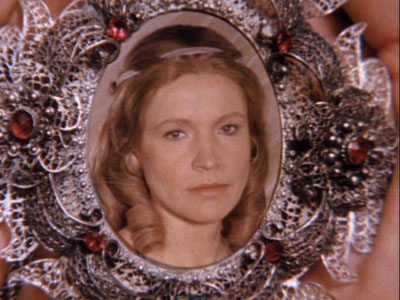
It's not clear exactly why the Queen of the Night thinks Tamino is the man for the job, given his complete failure to even muss the dragon's hair, but there you have it. It turns out that the evil magician Sarastro is not so much evil as he is wise, and he's kidnapped Pamina from her mother so that she can... marry Tamino. Which is also what her mother wants. Here's the fantastically named Ulrik Cold as Sarastro, thinking about the great responsibility that comes with great power:
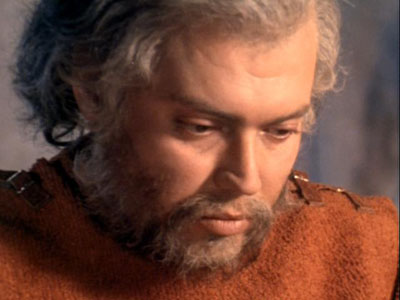
And here's the trustworthy Moor Sarastro has left to guard Pamina:
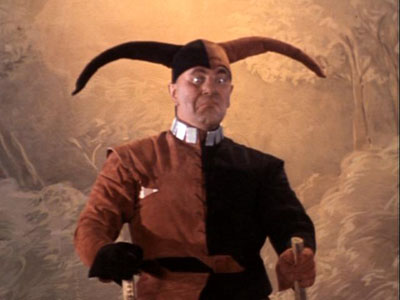
His name is Monostatos, he's played by Ragnar Ulfung, and he looks nothing at all like Ricky Gervais playing Andy Millman playing a genie in Extras.
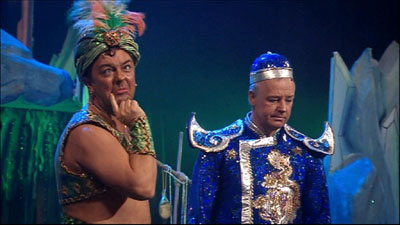
So that's the basic premise. Did I mention the plot was kind of a mess? Of course, the plot isn't Bergman's fault; he inherited it from Mozart and Schikaneder. And to his credit, Bergman does what he can to clean it up. He makes Sarastro into Pamina's father, so his claim of patriarchal power is slightly more legitimate. Still, it's disconcerting to see an opera where the main point seems to be that only by submitting to the absolute will of a Masonic patriarch can one find happiness.
As you can see from the stills, the filmmakers really stick to the conceit that we're seeing this in a theater. Olivier used the same strategy in the first section of Henry V, but abandoned the confines of the stage when Henry leaves for France. I kept waiting for something similar in Bergman's movie, but although some scenes are blocked in ways that would be impossible on a stage, things never open up. That's probably to be expected from Bergman; even in movies that are ostensibly in the real world, he deals best with interiors. And in Autumn Sonata, he deliberately handles flashbacks as though they were on stage. The best sequences in The Magic Flute deal with interior space; he has a talent for putting you inside the heads of his characters. Take the lovely eyeline match that closes Act I. Sarastro has just told Pamina and Tamino that Tamino will have to undergo three trials before they can be married. Tamino's just been blindfolded and is being led off; it's not clear (especially given The Dragon Incident) that he'll ever return. Bergman cuts between Sarastro:
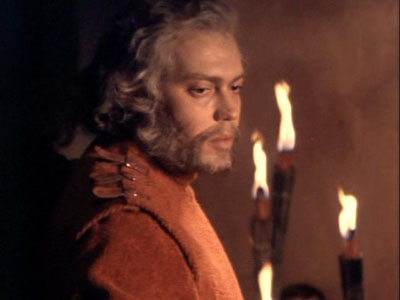
And Pamina:
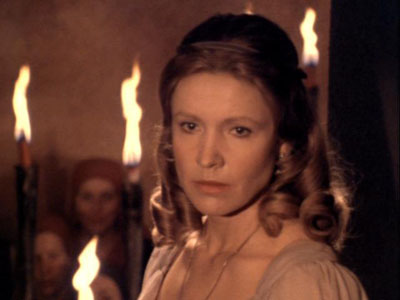
And it's impossible not to be moved by the concern and worry in each of their eyes. Look at how delicately and carefully lit both shots are—this is Sven Nykvist's cinematography at its best. On the subject of lighting, note this shot of Pamina and Monostatos:
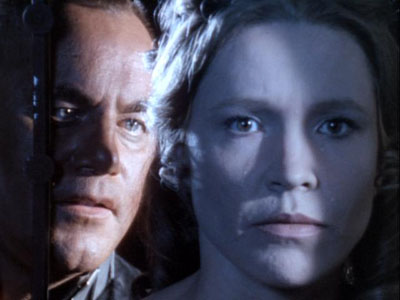
This is where being overtly theatrical pays off; that shot would be a hard sell in a more realistic film, but it's perfect here. And it's one of Bergman's favorite framings; you get to watch emotion play over both faces simultaneously. Compare it to the similar shot of Eva watching her mother play piano in Autumn Sonata and you'll see that this is what Bergman does best: mapping the interior spaces of people in pain. It's a cruel sort of talent, and I'm not sure it suits the material here, but nobody else was ever as good at this as Ingmar Bergman.
There's one other thing Bergman does phenomenally well, and that's horror. I've said it before and I'll say it again: this guy could have been the greatest horror director of all time. You can see this in "Der Hölle Rache kocht in meinem Herzen." Bergman has the Queen of the Night, in garish makeup, walk from side to side behind her attendants.
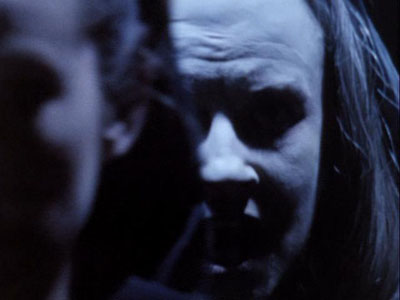
It's an inventive way of blocking this (and Mel Gibson appropriated it for Satan during the scourging scene in The Passion of the Christ); having the Queen's face move in and out of view rachets up the horribleness of the whole thing exponentially. Bergman also does an excellent job when Tamino and Pamina tour the underworld, and we see brief glimpses of people tearing each other apart through the flames:
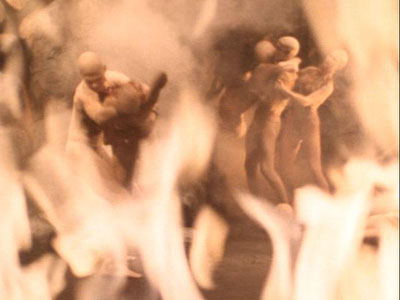
Obscuring our vision of these torments (who seem to be straight out of Dante's fifth circle) is much more frightening than seeing them directly. So Bergman's doing all right when it comes to suffering and horror, but you could have guessed that. How is he with comedy? Surprisingly enough, not too shabby. I'm inclined to credit this to Håkan Hagegård's performance as Papageno, the comic center of the opera. He's easily the most charming of the cast, mostly because of his skill at playing misery for laughs:
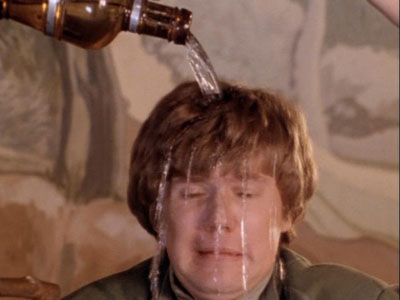
And it takes a special kind of actor to make a suicide attempt hilarious:
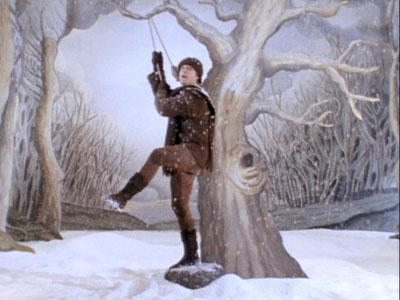
But the truth is, no one sees The Magic Flute on stage or on film because it's emotionally resonant, or frightening, or funny; Schikaneder's libretto is kind of a disaster. It's a beloved part of the repertoire because of the music. And although everyone who has ever reviewed the film seems to disagree with me, I have to report that the music is only average. Or rather, it's adequate, with a giant exception. The highlight of any production of The Magic Flute is "Der Hölle Rache kocht in meinem Herzen," an aria for colorata soprano sung by the Queen of the Night. It's so famously difficult that the almost-never-used high note in is sometimes referred to as the "Queen of the Night F." And although I'm not an opera critic, I don't think Birgit Nordin quite pulled it off. By way of comparison, here's Lucia Popp singing a difficult passage in an Otto-Klemperer-conducted performance from 1964:
And here's Birgit Nordin singing the same passage in Bergman's film:
It's not a question of musical taste; compare the pure, clear sound of Lucia Popp's voice to Nordin's and you can, I hope, hear the problem. It's probably churlish to judge an entire opera by its most difficult passage, and most of it was fine. But the sound's a little muddy throughout (and the film is discolored in that seventies-yellowed fashion). This is particularly strange because the sound is of historical importance; Peter Cowie writes that this was the very first stereo production for television. If a recording from 1964 sounds clearer, you probably need to remaster. And given the wonderful restoration work Criterion has done on other films, I couldn't believe they left the sound on an opera untouched.
The experience of watching The Magic Flute was more frustrating than enjoyable for me. There are so many elements in the opera that cry out for a broader treatment than the filmmakers give them here, so many missed opportunities. Most of the sets, and effects on the stage are designed to make small spaces seem large, and by the end of the film I wanted to scream, "Just take the fucking camera outside!" Filming the opera as though the audience is seeing it in a theater is an interesting conceptual idea. In the end, however, The Magic Flute is a fantasy, not the kind of claustrophobic interior story that lends itself to this kind of staging. In short, it's not a Bergman movie. But if Radio New Zealand wants to celebrate an anniversary in the next few years, I know just the director.
Randoms:
- The overture gets heat from virtually everyone who writes about this film. The filmmakers cut through carefully edited reaction shots of a multiracial audience enjoying the music. It's not a bad idea, I guess (and putting visuals to the overture is not an easy problem, if you start with the assumption that the curtain won't go up until after it's finished). But the sequence is way too long, and feels distinctly earnest in a way I associate only with the 1970s. It's easily the most dated part of the film. Here's the obligatory bindi shot:
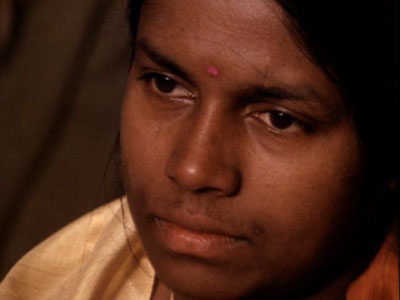
- The filmmakers burn through any good racial karma earned with the overture during the intermission, with a close up of one of Monostatos's henchmen, in terrible blackface. Monostatos himself is in blackface, but you're in trouble when you start using prosthetic noses.
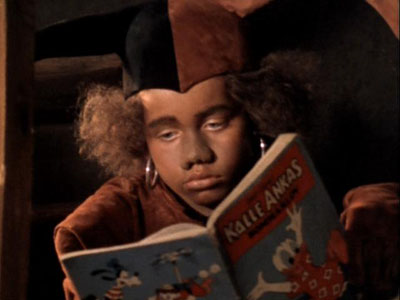
- Did these people learn nothing from Alec Guinness in Oliver Twist?
- If you like William Blake, you owe it to yourself to see this film, or some production of The Magic Flute. I hadn't realized the extent to which Blake was reacting to his age's zeitgeist. The Magic Flute is a perfect inversion of Blake's mythology, with Urizen as hero.
- The dragon that opens the opera is pretty silly looking, but he's got nothing on the simultaneously absurd and creepy animals that Tamino sings to later on:
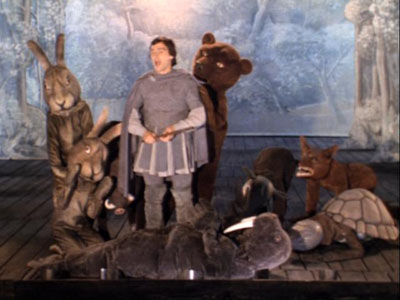
- Those rabbits will haunt my dreams. And although we're in the middle of the forest here, yes, that is a walrus:
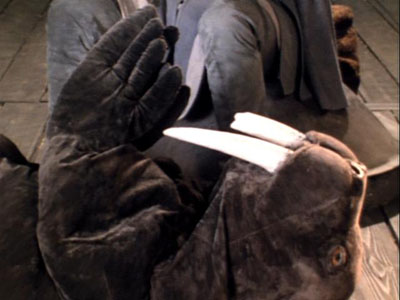
- Finally, there's this shot:
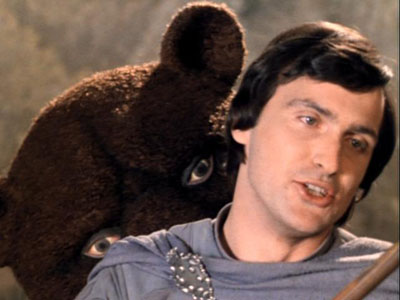
- I'm sure if Werner Herzog were looking into that bear's dead eyes, he'd say something profound about the inherent hostility and chaos of nature, but all I could think was "Threatdown!"


17 comments:
I agree with you about the Queen of the Night bit. I think the problem is that Nordin is a traditional dramatic coloratura, and the role is best performed by a lyric coloratura who can bit the high notes quickly and cleanly. Trouble is, for the rest of the opera the dramatic coloratura voice is fine.
Yeah, she is usually ok, but those sections, not so much. I'd been listening to the Klemperer recordings all week before seeing the film to get familiar with the music, though, so I was a little disappointed.
Herzog on the bear: boredom and the quest for food, wasn't it? I thought that was the moment in Grizzly Man where, for all his admirable sympathy, he finally nailed the delusory part of Treadwell's worldview.
And I did think that Bergman's treatment of "Ach! ich fuhl's" was fantastic.
Jimmy Doyle,
Yes, that's right -- he says something about hostility and cruelty as well, if I remember correctly. Agreed on "Ach! ich fuhls."
Interesting blog. Interesting comments on the films you discuss. I'd like to see a list of films that you consider "must see".
bg,
Perhaps I'll put such a list together when I hit a milestone number like #100.
[M]ess of a plot and paleolithic worldview. Don't hold back: what do you really think about Mozart's K.620? :-)
Well, I will say that I love the music! So it's Schikaneder I've got a problem with.
Another perceptive and brilliantly written review. The main point of this opera is its music, but the musical performances in the movie are not first rate and the sound is disappointing.
One witty feature is the way Bergman mocks the moralizing of the libretto by holding up its lessons on painted signs. The intermission shots of singers playing chess and peeping out at the audience are also very funny.
The plot of the opera is not weak. It is a Neoplatonic allegory. it is probably the best libretto of any opera I've ever encountered (I've somewhere over a hundred).
Film is absolutely the best medium to view opera. Frankly, seeing a stage production is tedious now since we are so used to seeing cinematic editing(the editing in this film is a masterpiece). The evocation of 18th century stage practice is absolutely brilliant.
The animals are avatars of the characters in the film (the bear is the queen, the lion Sarastro, the rabbits, Papageno and Papagena, the walrus, Tamino, etc.), another stroke of brilliance on Bergman's part.
Nordin can't sing the role, you're right. But considering what she looks like and the performance Bergman gets out of her, who cares? It adds to the feel of a local production.
Thanks for putting up the stills and potentially promoting the film
I've seen the Magic Flute live three times, a couple of other videos of live performances, and several audio recordings. I think the way Bergman moves from the recording of a staged performance, to a cinematic approach for some scenes, reflects the way opera operates in a live setting; at times you're more aware of the "exterior" of the production and performance and then you're drawn in to the character's inner experience. I also think the vocal approach throughout was toned way down, not just for the Queen of the Night. This production was filmed for TV and I think Bergman understood the intimacy of the medium was not served by a display of tonsils from singers accustomed to reaching the cheap sets in a live performance.
Anonymous,
I think the formal choices Bergman makes are interesting, as you say—and I didn't really think of the way you become more aware of the exterior of a play at times. That's really interesting, actually, because I don't think there's anything analogous in film, and I think you're right that that is part of what Bergman's changes in scale mean here.
But I also think Lucia Popp would have sounded just fine on TV, tonsils or no. I've never heard her live (never seen The Magic Flute live, in fact) but she sounds great on my stereo...
I couldn't disagree with you more. I've been a fan of Bergman and opera all of my life and I think what he did with this film was totally brilliant. Yes, it's theatrical, but it's also mysteriously inventive and elemental. It's playful and humble. Yes, some of the vocal performances aren't great, but I have always considered that he made far more of the character than the quality of the voice. I really felt like I got a deeper understanding and experience of these characters from his film than I would from a brilliantly sung but ultimately unimaginative opera staging.
Fredo,
We're going to have to agree to disagree on that; it didn't work for me. If that film is someone's only experience of The Magic Flute, they're not going to really get how amazing the music is.
Just came across this very interesting blog/review while watching (again) Bergman's Magic Flute. I was 12 years old in 1975 when it was aired on TV in Norway, where I'm from, and remember it made a huge impression on me.
Today, it does of course seem dated in some aspects - but it transcends this with a depth to the characters that I have never experienced in any other opera, live or filmed.
Having listened a couple of times to Popp vs. Nordin, I have to say I greatly prefer Nordin! It sounds to me as if she hits the notes better, and has a richness to her voice that is much more pleasing to me than Popp, who I find a little schreeching and abrupt...
"But the truth is, no one sees The Magic Flute on stage or on film because it's emotionally resonant, or frightening, or funny; Schikaneder's libretto is kind of a disaster."
Love the review--and am delighted with the blog, which I've just discovered,and been reading backward in time(!)--but I have to exception with this. Whether you like Mozart or not, Schikaneder's libretto was fairly standard for its time and place. Its audience was a sophisticated, cross-class one that had enough of logic, sickness, ugliness in their lives, and wanted great heroes, terrible monsters, and love to win out in the end on stage. In this respect Schikaneder is considerably better than the writing pulled out of Lucas' ass for Star Wars; and the logic no worse than so many comicbook-style superhero films, where people fighting to death engage in faux-Noel Coward style witty exchanges while fighting, and always, always make a point of letting the villains who have killed many people live, because They're Good.
Schikaneder's goulash-style entertainment was the norm for a long time. Shakespeare touched it with his genius repeatedly, but one doesn't go to plays like The Tempest for logic; one goes for magic. And if Shakespeare added the magics of language and insight, still, that's why he was Shakespeare. Schikaneder none the worse for providing a fun evening that mixes comedy, tragedy, romance, magic, and noble ideals.
I am so glad this movie exists. I want to MST it so badly.
Post a Comment